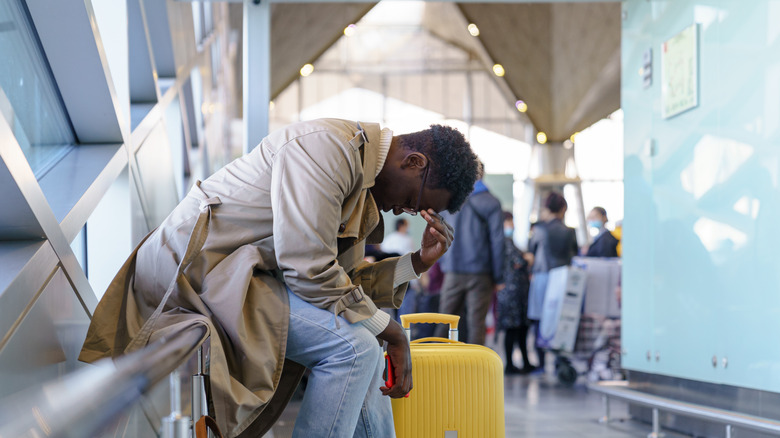This Common Mistake Is Probably What's Causing Your Jet Lag
Experiencing jet lag on vacation can be quite a bummer. After spending hours or possibly the day traveling to an exciting destination, jet lag is the last thing you want to plan for. Healthline describes jet lag as a disruption in your circadian rhythm due to a new time zone. These mismatched rhythms, in turn, affect your well-being. While it's temporary, it often interferes with travel plans by causing fatigue, upset stomach, headaches, drowsiness, lethargy, and more.
"When you travel across time zones rapidly, you change the light-dark cycle so quickly that the body clock can't keep up," shares Steven Lockley, neuroscientist and co-founder and chief scientist at Timeshifter, with Mindbodygreen. Plane travel, in particular, exacerbates jet lag due to the plane's speed not giving your brain and internal clock enough time to adjust (via Cleveland Clinic).
However, this isn't the only cause of jet lag. Cleveland Clinic mentions other factors that often worsen symptoms, including sitting for long periods, decreased air pressure, and dehydration from low humidity or warm cabin pressure on a plane. Moreover, Mindbodygreen points out that cut-and-dried advice on how to get rid of jet lag can actually exacerbate the problem, so what should you do instead?
How to prevent and care for jet lag
Keep in mind, jet lag naturally ends once your environment and circadian rhythm are synced. Lockley points out to Mindbodygreen that there are different internal clocks with various loops — 24 hours, 23.5 hours and 25 hours — so some people may adjust quicker than others. However, acceleration is possible for anyone using specific light and dark exposure techniques, says Lockley.
After arriving at your destination, immediately try to soak up the sun. According to Cleveland Clinic, getting outdoors and basking in sunlight alerts your body to wake up. Likewise, you'll also want to prioritize getting quality sleep. Setting up this sleep-wake cycle is important when caring for jet lag. If you're having trouble staying awake or falling asleep, consider incorporating melatonin and caffeine to help you adjust to both sleeping and staying awake (per Mindbodygreen).
Lastly, stay hydrated during and after your flight. While it's impossible to prevent or avoid jet lag, these tips may help you bounce back quicker, along with eating healthy foods, exercising, and adding an extra "travel day" to help your body adjust better.

